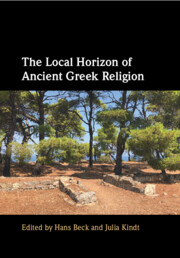Book contents
- The Local Horizon of Ancient Greek Religion
- The Local Horizon of Ancient Greek Religion
- Copyright page
- Contents
- Figures
- Contributors
- Preface
- Abbreviations
- 1 Localism and the Study of Ancient Greek Religion: The Example of the Divine Persona
- 2 Refitting the Local Horizon of Ancient Greek Religion (Including Some Remarks on the Sanctuary of Poseidon on Kalaureia)
- 3 Mycenaean Greek Worship in Minoan Territory
- 4 Hera on Samos: Between the Global and the Local
- 5 Polytheism and the Distribution of Votives in the Corinthia
- 6 Demeter Chthonia at Hermione: Landscapes and Cult
- 7 Local Variation in the Thesmophoria Festival: A Case Study of the Attic and Sicilian Thesmophoria Festivals
- 8 The Lindian Chronicle and Local Identity
- 9 Shifting Identities and Defensive Localism: Conflicts of Religious Narratives in Post-Synoikism Rhodes
- 10 Between Local and Global? Religion in Late-Hellenistic Delos
- 11 Personal or Communal? Social Horizons of Local Greek Religion
- 12 How to Write a Local History of Imperial Greek Cults: Observations from Pausanias
- 13 Panhellenic Sanctuaries: Local and Regional Perspectives
- Epilogue: A Tribute to Potnia of the Labyrinth
- Index
- References
Epilogue: A Tribute to Potnia of the Labyrinth
Published online by Cambridge University Press: 06 April 2023
- The Local Horizon of Ancient Greek Religion
- The Local Horizon of Ancient Greek Religion
- Copyright page
- Contents
- Figures
- Contributors
- Preface
- Abbreviations
- 1 Localism and the Study of Ancient Greek Religion: The Example of the Divine Persona
- 2 Refitting the Local Horizon of Ancient Greek Religion (Including Some Remarks on the Sanctuary of Poseidon on Kalaureia)
- 3 Mycenaean Greek Worship in Minoan Territory
- 4 Hera on Samos: Between the Global and the Local
- 5 Polytheism and the Distribution of Votives in the Corinthia
- 6 Demeter Chthonia at Hermione: Landscapes and Cult
- 7 Local Variation in the Thesmophoria Festival: A Case Study of the Attic and Sicilian Thesmophoria Festivals
- 8 The Lindian Chronicle and Local Identity
- 9 Shifting Identities and Defensive Localism: Conflicts of Religious Narratives in Post-Synoikism Rhodes
- 10 Between Local and Global? Religion in Late-Hellenistic Delos
- 11 Personal or Communal? Social Horizons of Local Greek Religion
- 12 How to Write a Local History of Imperial Greek Cults: Observations from Pausanias
- 13 Panhellenic Sanctuaries: Local and Regional Perspectives
- Epilogue: A Tribute to Potnia of the Labyrinth
- Index
- References
Summary
Rethinking the local horizon of Greek religion is a challenging but necessary endeavour. After two decades of fascination with Mediterranean connectivity and entangled worlds, it is worthwhile to remember that a significant part of the population in Antiquity, as well as in later periods up to the twentieth century, moved and functioned in a vital space that hardly exceeded a radius of 25 km from their home.1 This observation provides an image of a ‘small world’ that is quite different from the one recently explored by Irad Malkin. The attention paid to the local dimension is by no means a historiographical narrowing: works on globalisation and its early manifestations in Antiquity convincingly ascertained that the global–local binomial, with various variations and intermediate scales, was structurally inescapable. In other words, questioning the local dimension of Greek religion in no way means isolating idiosyncratic cultic realities and studying specific identities in restricted contexts. On the contrary, as all the contributions in this book show, it is a matter of articulating several levels of social reality, in which the local dimension fuels interactions, comparisons, differentiations, collaborations, representations, within individual and collective dynamics. In ancient Mediterranean contexts, distant in time and space, with variable unknowns and incomplete evidence, it is necessary and salutary to avoid optimistic generalisation and to carefully analyse each single situation as a social laboratory prone to elaborate creative social devices. Religion is a space of communication between people and superhuman entities, open to change and uncertainty. The local scale is, at the same time, the most evident, rich, and intricate layer for an archaeology of religious practices.
- Type
- Chapter
- Information
- The Local Horizon of Ancient Greek Religion , pp. 376 - 386Publisher: Cambridge University PressPrint publication year: 2023

